Unit 2 Colour Period 3课件(共30张PPT,含内嵌视频) 牛津译林版英语九年级上册
文档属性
| 名称 | Unit 2 Colour Period 3课件(共30张PPT,含内嵌视频) 牛津译林版英语九年级上册 | 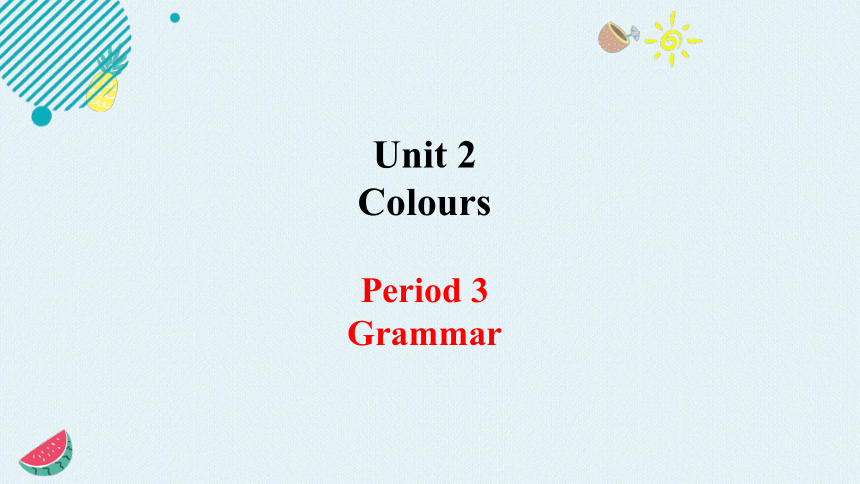 | |
| 格式 | pptx | ||
| 文件大小 | 12.0MB | ||
| 资源类型 | 教案 | ||
| 版本资源 | 牛津译林版 | ||
| 科目 | 英语 | ||
| 更新时间 | 2024-07-21 16:37:13 | ||
图片预览

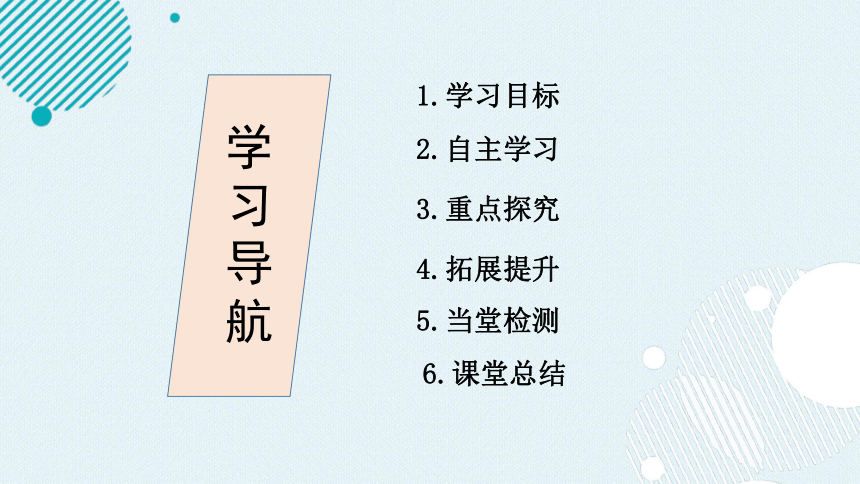
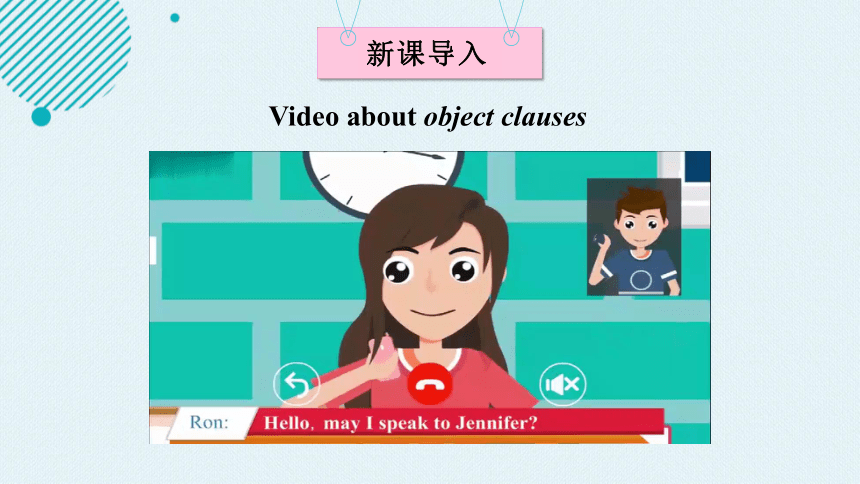
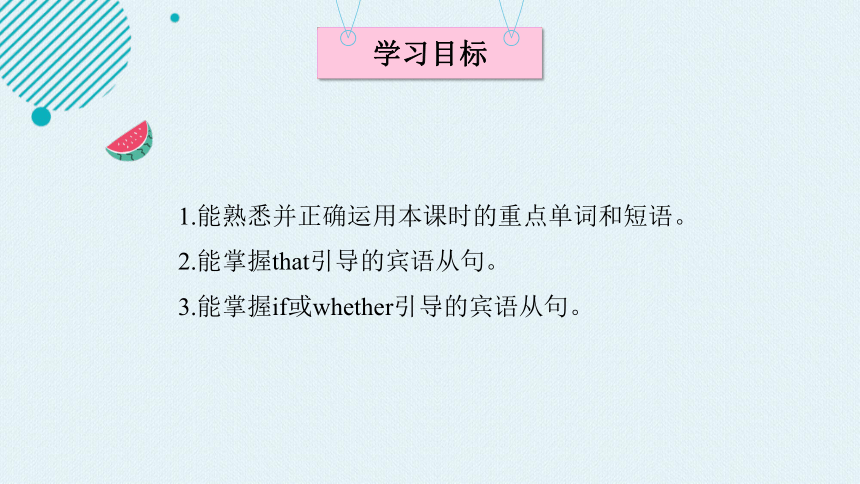
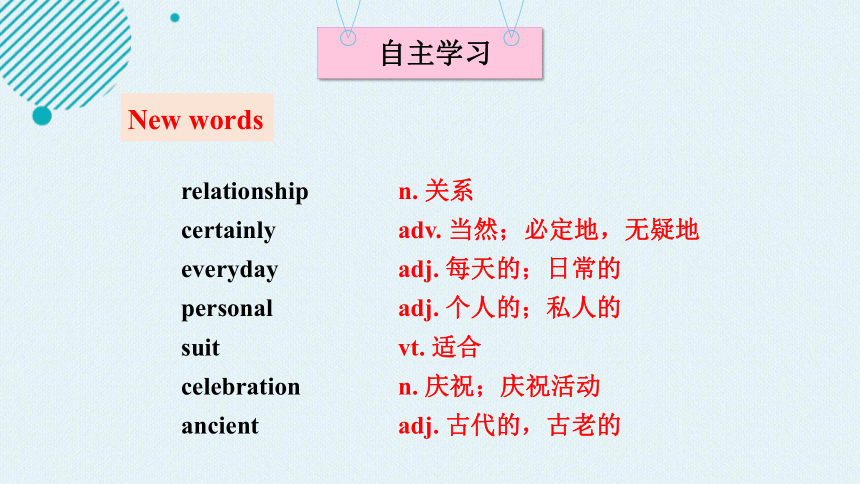
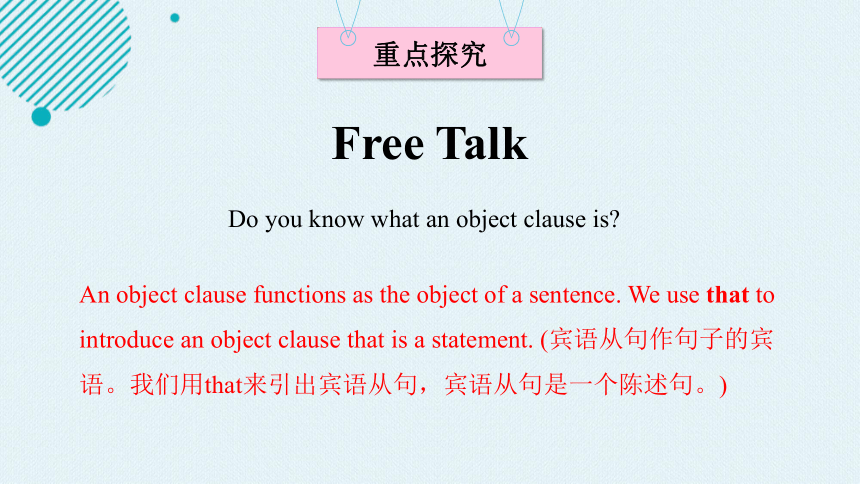
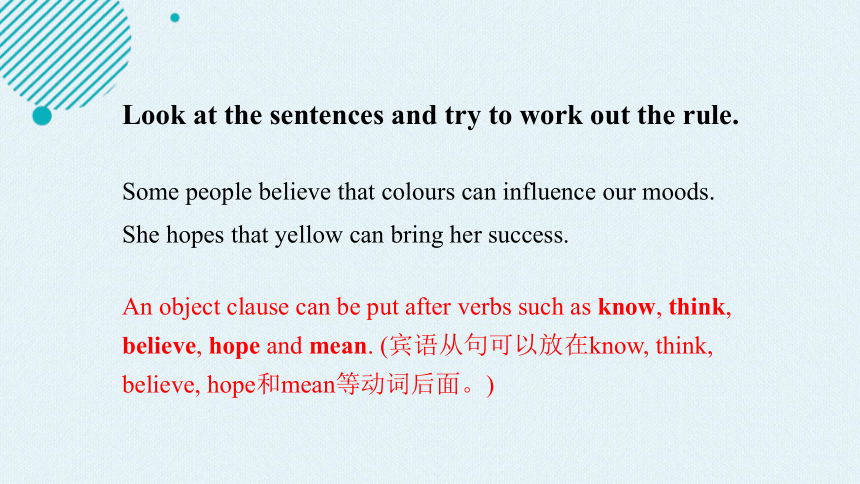
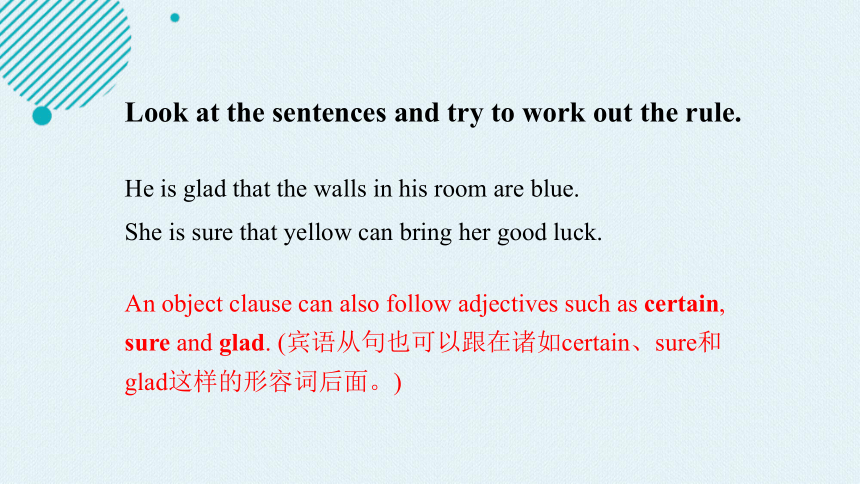
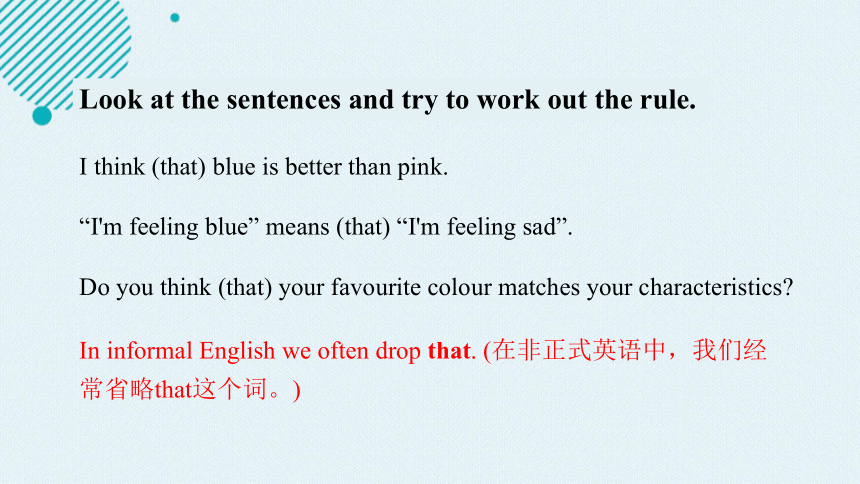
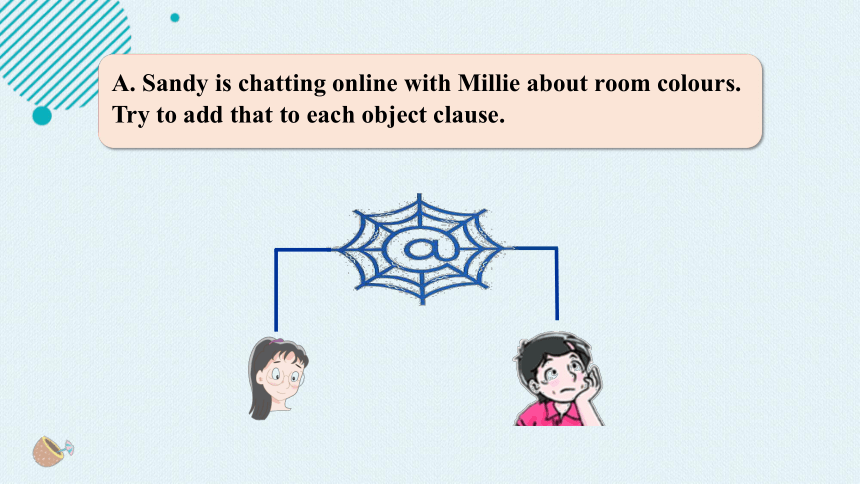
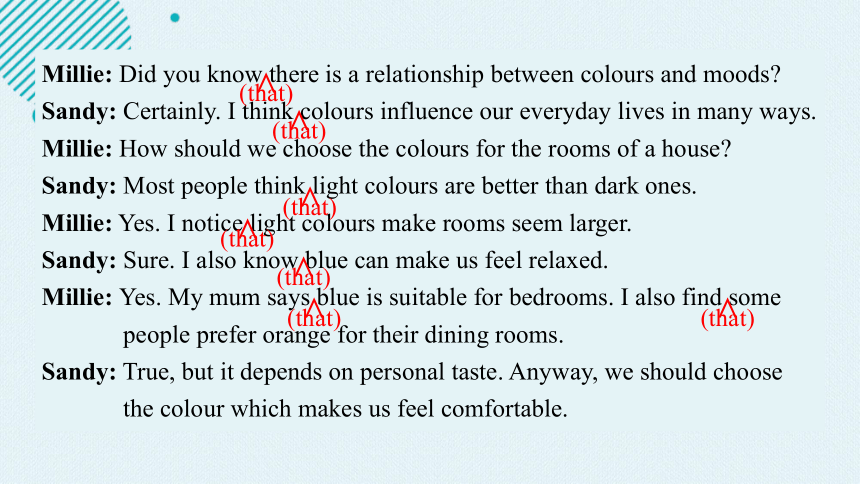
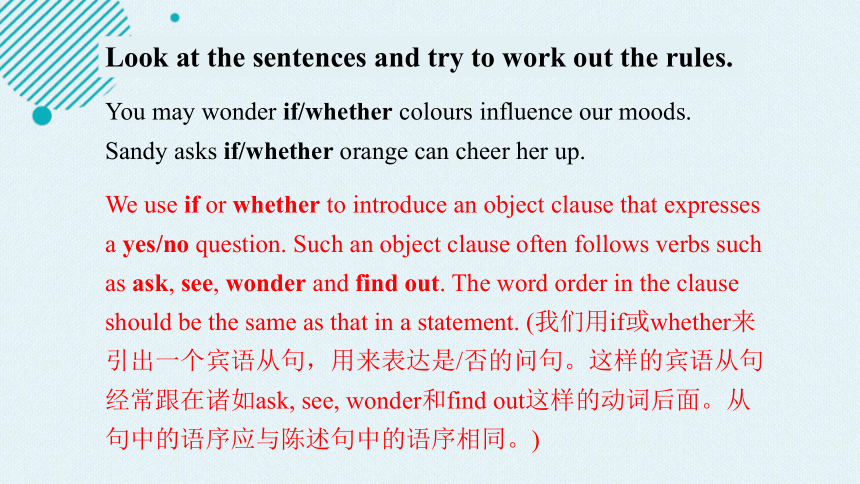
文档简介
(共30张PPT)
Unit 2
Colours
Period 3
Grammar
1.学习目标
3.重点探究
2.自主学习
学习导航
5.当堂检测
6.课堂总结
4.拓展提升
新课导入
Video about object clauses
1.能熟悉并正确运用本课时的重点单词和短语。
2.能掌握that引导的宾语从句。
3.能掌握if或whether引导的宾语从句。
学习目标
New words
自主学习
relationship
certainly
everyday
personal
suit
celebration
ancient
n. 关系
adv. 当然;必定地,无疑地
adj. 每天的;日常的
adj. 个人的;私人的
vt. 适合
n. 庆祝;庆祝活动
adj. 古代的,古老的
重点探究
Free Talk
An object clause functions as the object of a sentence. We use that to introduce an object clause that is a statement. (宾语从句作句子的宾语。我们用that来引出宾语从句,宾语从句是一个陈述句。)
Do you know what an object clause is
Look at the sentences and try to work out the rule.
An object clause can be put after verbs such as know, think, believe, hope and mean. (宾语从句可以放在know, think, believe, hope和mean等动词后面。)
Some people believe that colours can influence our moods.
She hopes that yellow can bring her success.
Look at the sentences and try to work out the rule.
An object clause can also follow adjectives such as certain, sure and glad. (宾语从句也可以跟在诸如certain、sure和glad这样的形容词后面。)
He is glad that the walls in his room are blue.
She is sure that yellow can bring her good luck.
Look at the sentences and try to work out the rule.
In informal English we often drop that. (在非正式英语中,我们经常省略that这个词。)
I think (that) blue is better than pink.
“I'm feeling blue” means (that) “I'm feeling sad”.
Do you think (that) your favourite colour matches your characteristics
A. Sandy is chatting online with Millie about room colours. Try to add that to each object clause.
Millie: Did you know there is a relationship between colours and moods
Sandy: Certainly. I think colours influence our everyday lives in many ways.
Millie: How should we choose the colours for the rooms of a house
Sandy: Most people think light colours are better than dark ones.
Millie: Yes. I notice light colours make rooms seem larger.
Sandy: Sure. I also know blue can make us feel relaxed.
Millie: Yes. My mum says blue is suitable for bedrooms. I also find some
people prefer orange for their dining rooms.
Sandy: True, but it depends on personal taste. Anyway, we should choose
the colour which makes us feel comfortable.
∧
(that)
∧
(that)
∧
(that)
∧
(that)
∧
(that)
∧
(that)
∧
(that)
Look at the sentences and try to work out the rules.
We use if or whether to introduce an object clause that expresses a yes/no question. Such an object clause often follows verbs such as ask, see, wonder and find out. The word order in the clause should be the same as that in a statement. (我们用if或whether来引出一个宾语从句,用来表达是/否的问句。这样的宾语从句经常跟在诸如ask, see, wonder和find out这样的动词后面。从句中的语序应与陈述句中的语序相同。)
You may wonder if/whether colours influence our moods.
Sandy asks if/whether orange can cheer her up.
B1. The Class 1, Grade 9 students are plete the sentences by using if or whether to make object clauses.
Should I choose the red dress
Kitty cannot decide ______________________
______________________________________
if/whether she should
choose the red dress.
Do white clothes suit me
Sandy does not know___________________ ____________________________________
if/whether white
clothes suit her.
Is the sports bag made of cotton
Does the green T-shirt match my trousers
Amy is asking ___________________________
_______________________________________
if/whether the sports bag is
made of cotton.
Simon is not sure _________________________
_______________________________________
if/whether the green T-shirt
matches his trousers.
Should I stay at home instead of going shopping with my classmates
Daniel often wonders ______________________
________________________________________
home instead of going shopping with his classmates.
if/whether he should stay at
B2. Daniel wants to tell his online friend Tommy about colours. Help him complete his email using that, if or whether.
Dear Tommy,
Have you ever noticed the colours around you Colours are really interesting. A report says ________ blue can help us feel relaxed because it represents peace. You may wonder ________ it represents anything else. Yes. Blue also means sadness. I do not know ________ you like green. Some people think ________ green can give us energy,
that
if/whether
if/whether
that
but it also represents envy. Did you know __________ red represents good luck in China It is often used for celebrations!
Please tell me your favourite colour and __________ you know anything else about colours. Write back soon.
Best wishes,
Daniel
that
if/whether
B3. Daniel has some questions about colours to ask his dad, but his dad has not come home yet. Help him write a note for his dad.
1. Dad knows a lot about colours.
2. Is red just the colour of heat and power
3. Was yellow once the colour of the rulers in ancient China
4. Did the rulers in ancient Europe like to wear purple
5. Do all the doctors in the world wear white uniforms
I believe_____________________________________________.
I wonder ____________________________________________.
I want to know _______________________________________
____________________________________________________.
I do not know ________________________________________
____________________________________________________.
I am not certain _______________________________________
____________________________________________________.
(that) Dad knows a lot about colours
if/whether red is just the colour of heat and power
if/whether yellow was once the colour of the
rulers in ancient China
if/whether the rulers in ancient Europe liked to wear purple
if/whether all the doctors in the world wear white uniforms
拓展提升
that引导的宾语从句
宾语从句是指在复合句中充当宾语的句子。如:
He thinks that he can go swimming tomorrow.
他认为他明天能去游泳。
I am glad that you can come for dinner.
我很高兴你能来吃晚餐。
注意:宾语从句可用于主句动词之后,如:know、think、believe、hope、mean;也可用于主句形容词之后,如:certain、sure、glad。
我们可用that引导宾语从句,此时从句部分相当于一个陈述句。如:
I hear that you have passed the exam.
我听说你通过考试了。
引导宾语从句的that没有词义,不充当句子成分,在口语或非正式文体中常常被省略。如:
I do not believe (that) he has never been to the USA.
我不相信他从没去过美国。
拓展:
1. 当主句是一般现在时,宾语从句的时态不作限制,我们可以根据句子的需要使用任何一种时态。(需要性原则)
I hear
(that)
Jim _____(be)a worker two years ago.
Jim _____(be)an English teacher now.
Jim ________(cook)dinner tomorrow.
Jim ________(sing)a popular song now.
Jim _______(be)to the Great Wall twice.
Jim __________(play)basketball when his father came back.
is
will cook
is singing
has been
was playing
was
2. 当主句是一般过去时的时候,宾语从句必须用相对应的过去的某一种时态,从而达到主句和从句的相互一致。(呼应性原则)
1)He will go to Hong Kong.
2)He is sick.
3)He is reading a book.
He said
(that)
1)He __________to Hong Kong.
2)He __________sick.
3)He ___________a book.
would go
was
was reading
确定从句的时态(根据主句时态)
主句时态
从 句 时 态
连 接 前
连 接 后
一般现在时
时态保持不变
一般过去时
一般现在时
一般过去时
一般过去时
过去完成时
一般将来时
过去将来时
现在进行时
过去进行时
现在完成时
过去完成时
3. 当宾语从句说明的是客观存在的事实或者是客观存在的真理时,就不用受到主句时态的限制,仍是用一般现在时。(特殊性原则)
He told me (that) Summer is after Spring.
I was told (that) the sun is much bigger than the moon.
My parents told me (that) no news is good news.
if或whether引导的宾语从句
我们可用if或whether引导宾语从句,此时从句部分的语义相当于一个一般疑问句。如:I want to know if/whether he is our new teacher. 我想知道他是不是我们的新老师。
连词if和whether意思是“是否”,在从句中不充当句子成分,在口语中多用if。如:
Tom wonders if/whether his grandpa will come next week.
汤姆想知道他的爷爷是否下周过来。
宾语从句的语序必须是陈述语序,即“连接词+主语+谓语+其他成分”。如:
“Did Mary clean the classroom yesterday ” Mr Hu is asking.
Mr Hu is asking if/whether Mary cleaned the classroom yesterday.
胡老师问昨天玛丽是否打扫教室了。
宾语从句中的人称代词要符合逻辑,有时需进行合理变化。如:
She wonders, “Can I keep that book for one more week ”
She wonders if/whether she can keep that book for one more week。
她想知道那本书她能不能再借一个星期。
“Can you help me ” she asks.
She asks if/whether I can help her. 她问我能不能帮助她。
拓展:宾语从句只用whether不用if的情况。
1.在介词后面:
We are worried about whether it will rain tomorrow.
2.在动词不定式前:
He can't decide whether to go to Canada.
3.当与or或or not连用时:
I don't know whether he's free or not.
She asks me whether I am from Yancheng or Nanjing.
4.宾语从句提前时:
Whether this is true or not, I can't say.
当堂检测
一、用if和whether填空。
1. Uncle John came up to see _________ there was anything wrong with the computer.
2. The shopkeeper asked my father ________ or not he wanted to choose a big Christmas tree.
3. I don't know __________ to go or stay
4. _______ time runs out, what should we do
5. ________ they will ever become future Olympic champions, only time will tell.
if/whether
whether
whether
Whether
If
1. She knows. Timmy is a good boy.
2. His father said. One and one is two.
3. He said. Lucy often goes shopping.
4. He is doing his homework. He said.
5. We realize. We should work hard.
二、改写句子。
She knows (that) Timmy is a good boy.
His father said (that) one and one is two.
He said (that) Lucy often went shopping.
He said (that) he was doing his homework.
We realize (that) we should work hard.
课堂总结
重点单词和短语:
relationship, certainly, everyday, personal, suit, celebration, ancient
that引导的宾语从句:
我们可用that引导宾语从句,此时从句部分相当于一个_______;引导宾语从句的that没有词义,不充当句子成分,在口语或非正式文体中常常被______。
if/whether引导的宾语从句:
我们可用if或whether引导宾语从句,此时从句部分的语义相当于一个____________。
Unit 2
Period 3
陈述句
省略
一般疑问句
Unit 2
Colours
Period 3
Grammar
1.学习目标
3.重点探究
2.自主学习
学习导航
5.当堂检测
6.课堂总结
4.拓展提升
新课导入
Video about object clauses
1.能熟悉并正确运用本课时的重点单词和短语。
2.能掌握that引导的宾语从句。
3.能掌握if或whether引导的宾语从句。
学习目标
New words
自主学习
relationship
certainly
everyday
personal
suit
celebration
ancient
n. 关系
adv. 当然;必定地,无疑地
adj. 每天的;日常的
adj. 个人的;私人的
vt. 适合
n. 庆祝;庆祝活动
adj. 古代的,古老的
重点探究
Free Talk
An object clause functions as the object of a sentence. We use that to introduce an object clause that is a statement. (宾语从句作句子的宾语。我们用that来引出宾语从句,宾语从句是一个陈述句。)
Do you know what an object clause is
Look at the sentences and try to work out the rule.
An object clause can be put after verbs such as know, think, believe, hope and mean. (宾语从句可以放在know, think, believe, hope和mean等动词后面。)
Some people believe that colours can influence our moods.
She hopes that yellow can bring her success.
Look at the sentences and try to work out the rule.
An object clause can also follow adjectives such as certain, sure and glad. (宾语从句也可以跟在诸如certain、sure和glad这样的形容词后面。)
He is glad that the walls in his room are blue.
She is sure that yellow can bring her good luck.
Look at the sentences and try to work out the rule.
In informal English we often drop that. (在非正式英语中,我们经常省略that这个词。)
I think (that) blue is better than pink.
“I'm feeling blue” means (that) “I'm feeling sad”.
Do you think (that) your favourite colour matches your characteristics
A. Sandy is chatting online with Millie about room colours. Try to add that to each object clause.
Millie: Did you know there is a relationship between colours and moods
Sandy: Certainly. I think colours influence our everyday lives in many ways.
Millie: How should we choose the colours for the rooms of a house
Sandy: Most people think light colours are better than dark ones.
Millie: Yes. I notice light colours make rooms seem larger.
Sandy: Sure. I also know blue can make us feel relaxed.
Millie: Yes. My mum says blue is suitable for bedrooms. I also find some
people prefer orange for their dining rooms.
Sandy: True, but it depends on personal taste. Anyway, we should choose
the colour which makes us feel comfortable.
∧
(that)
∧
(that)
∧
(that)
∧
(that)
∧
(that)
∧
(that)
∧
(that)
Look at the sentences and try to work out the rules.
We use if or whether to introduce an object clause that expresses a yes/no question. Such an object clause often follows verbs such as ask, see, wonder and find out. The word order in the clause should be the same as that in a statement. (我们用if或whether来引出一个宾语从句,用来表达是/否的问句。这样的宾语从句经常跟在诸如ask, see, wonder和find out这样的动词后面。从句中的语序应与陈述句中的语序相同。)
You may wonder if/whether colours influence our moods.
Sandy asks if/whether orange can cheer her up.
B1. The Class 1, Grade 9 students are plete the sentences by using if or whether to make object clauses.
Should I choose the red dress
Kitty cannot decide ______________________
______________________________________
if/whether she should
choose the red dress.
Do white clothes suit me
Sandy does not know___________________ ____________________________________
if/whether white
clothes suit her.
Is the sports bag made of cotton
Does the green T-shirt match my trousers
Amy is asking ___________________________
_______________________________________
if/whether the sports bag is
made of cotton.
Simon is not sure _________________________
_______________________________________
if/whether the green T-shirt
matches his trousers.
Should I stay at home instead of going shopping with my classmates
Daniel often wonders ______________________
________________________________________
home instead of going shopping with his classmates.
if/whether he should stay at
B2. Daniel wants to tell his online friend Tommy about colours. Help him complete his email using that, if or whether.
Dear Tommy,
Have you ever noticed the colours around you Colours are really interesting. A report says ________ blue can help us feel relaxed because it represents peace. You may wonder ________ it represents anything else. Yes. Blue also means sadness. I do not know ________ you like green. Some people think ________ green can give us energy,
that
if/whether
if/whether
that
but it also represents envy. Did you know __________ red represents good luck in China It is often used for celebrations!
Please tell me your favourite colour and __________ you know anything else about colours. Write back soon.
Best wishes,
Daniel
that
if/whether
B3. Daniel has some questions about colours to ask his dad, but his dad has not come home yet. Help him write a note for his dad.
1. Dad knows a lot about colours.
2. Is red just the colour of heat and power
3. Was yellow once the colour of the rulers in ancient China
4. Did the rulers in ancient Europe like to wear purple
5. Do all the doctors in the world wear white uniforms
I believe_____________________________________________.
I wonder ____________________________________________.
I want to know _______________________________________
____________________________________________________.
I do not know ________________________________________
____________________________________________________.
I am not certain _______________________________________
____________________________________________________.
(that) Dad knows a lot about colours
if/whether red is just the colour of heat and power
if/whether yellow was once the colour of the
rulers in ancient China
if/whether the rulers in ancient Europe liked to wear purple
if/whether all the doctors in the world wear white uniforms
拓展提升
that引导的宾语从句
宾语从句是指在复合句中充当宾语的句子。如:
He thinks that he can go swimming tomorrow.
他认为他明天能去游泳。
I am glad that you can come for dinner.
我很高兴你能来吃晚餐。
注意:宾语从句可用于主句动词之后,如:know、think、believe、hope、mean;也可用于主句形容词之后,如:certain、sure、glad。
我们可用that引导宾语从句,此时从句部分相当于一个陈述句。如:
I hear that you have passed the exam.
我听说你通过考试了。
引导宾语从句的that没有词义,不充当句子成分,在口语或非正式文体中常常被省略。如:
I do not believe (that) he has never been to the USA.
我不相信他从没去过美国。
拓展:
1. 当主句是一般现在时,宾语从句的时态不作限制,我们可以根据句子的需要使用任何一种时态。(需要性原则)
I hear
(that)
Jim _____(be)a worker two years ago.
Jim _____(be)an English teacher now.
Jim ________(cook)dinner tomorrow.
Jim ________(sing)a popular song now.
Jim _______(be)to the Great Wall twice.
Jim __________(play)basketball when his father came back.
is
will cook
is singing
has been
was playing
was
2. 当主句是一般过去时的时候,宾语从句必须用相对应的过去的某一种时态,从而达到主句和从句的相互一致。(呼应性原则)
1)He will go to Hong Kong.
2)He is sick.
3)He is reading a book.
He said
(that)
1)He __________to Hong Kong.
2)He __________sick.
3)He ___________a book.
would go
was
was reading
确定从句的时态(根据主句时态)
主句时态
从 句 时 态
连 接 前
连 接 后
一般现在时
时态保持不变
一般过去时
一般现在时
一般过去时
一般过去时
过去完成时
一般将来时
过去将来时
现在进行时
过去进行时
现在完成时
过去完成时
3. 当宾语从句说明的是客观存在的事实或者是客观存在的真理时,就不用受到主句时态的限制,仍是用一般现在时。(特殊性原则)
He told me (that) Summer is after Spring.
I was told (that) the sun is much bigger than the moon.
My parents told me (that) no news is good news.
if或whether引导的宾语从句
我们可用if或whether引导宾语从句,此时从句部分的语义相当于一个一般疑问句。如:I want to know if/whether he is our new teacher. 我想知道他是不是我们的新老师。
连词if和whether意思是“是否”,在从句中不充当句子成分,在口语中多用if。如:
Tom wonders if/whether his grandpa will come next week.
汤姆想知道他的爷爷是否下周过来。
宾语从句的语序必须是陈述语序,即“连接词+主语+谓语+其他成分”。如:
“Did Mary clean the classroom yesterday ” Mr Hu is asking.
Mr Hu is asking if/whether Mary cleaned the classroom yesterday.
胡老师问昨天玛丽是否打扫教室了。
宾语从句中的人称代词要符合逻辑,有时需进行合理变化。如:
She wonders, “Can I keep that book for one more week ”
She wonders if/whether she can keep that book for one more week。
她想知道那本书她能不能再借一个星期。
“Can you help me ” she asks.
She asks if/whether I can help her. 她问我能不能帮助她。
拓展:宾语从句只用whether不用if的情况。
1.在介词后面:
We are worried about whether it will rain tomorrow.
2.在动词不定式前:
He can't decide whether to go to Canada.
3.当与or或or not连用时:
I don't know whether he's free or not.
She asks me whether I am from Yancheng or Nanjing.
4.宾语从句提前时:
Whether this is true or not, I can't say.
当堂检测
一、用if和whether填空。
1. Uncle John came up to see _________ there was anything wrong with the computer.
2. The shopkeeper asked my father ________ or not he wanted to choose a big Christmas tree.
3. I don't know __________ to go or stay
4. _______ time runs out, what should we do
5. ________ they will ever become future Olympic champions, only time will tell.
if/whether
whether
whether
Whether
If
1. She knows. Timmy is a good boy.
2. His father said. One and one is two.
3. He said. Lucy often goes shopping.
4. He is doing his homework. He said.
5. We realize. We should work hard.
二、改写句子。
She knows (that) Timmy is a good boy.
His father said (that) one and one is two.
He said (that) Lucy often went shopping.
He said (that) he was doing his homework.
We realize (that) we should work hard.
课堂总结
重点单词和短语:
relationship, certainly, everyday, personal, suit, celebration, ancient
that引导的宾语从句:
我们可用that引导宾语从句,此时从句部分相当于一个_______;引导宾语从句的that没有词义,不充当句子成分,在口语或非正式文体中常常被______。
if/whether引导的宾语从句:
我们可用if或whether引导宾语从句,此时从句部分的语义相当于一个____________。
Unit 2
Period 3
陈述句
省略
一般疑问句
